Financial freedom and the value of time
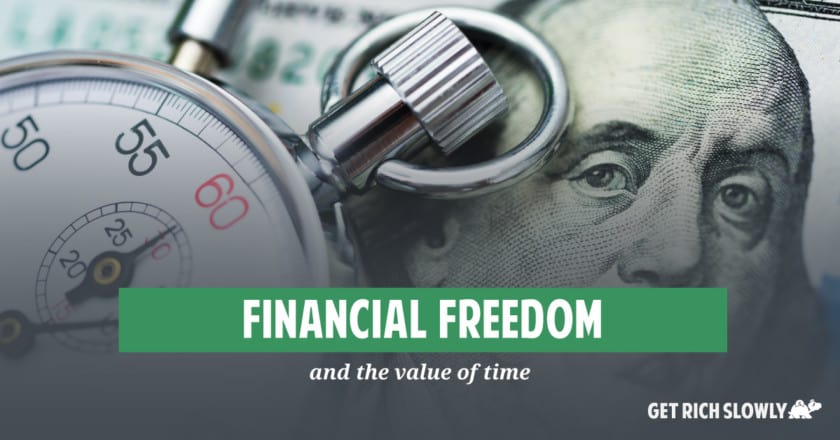
Note from J.D.
Last October, I had a chance to read an advance copy of Grant Sabatier's new book, Financial Freedom, which was just released this morning. I liked it. I loved parts of it. In fact, the second chapter of Financial Freedom inspired my article about how time is more valuable than money.Today, I'm pleased to present a (heavily edited) excerpt from that second chapter. Here's Sabatier on why time is more valuable than money -- and why you can and should retire early. (Links and photos are from me. Everything else is from the book. Note, however, I've heavily edited this chapter in order to abridge it and to make it more readable in blog format.)
If some ninety-year-old rich dude offered you $100 million to trade places with him, would you do it? Of course not. Why? Because time is more valuable than money.
The stages of financial freedom: The road to financial independence
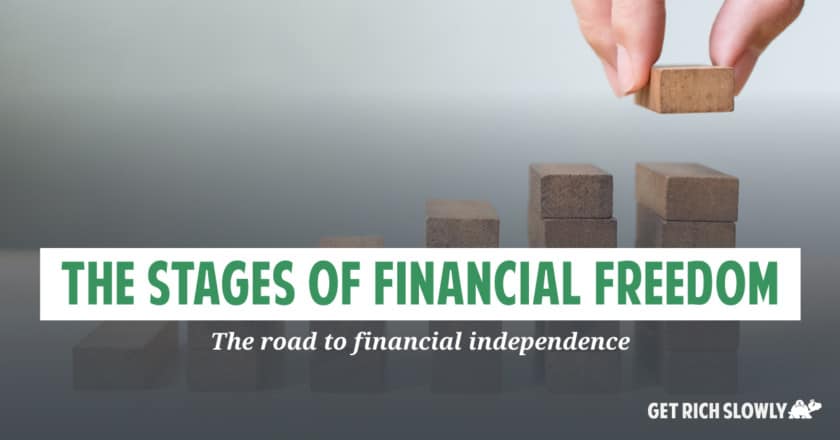
Today we're going to explore the six stages of financial freedom. First, though, I want to introduce you to my friends Mac and Pam.
Pam is a pathologist and an elite ultra-runner. Mac is a former high-school science teacher and current stay-at-home dad. Together, they form a formidable financial team.
They're also a couple of nerds. I mean, look at them!
Time is money: How frugality buys freedom — tomorrow AND today
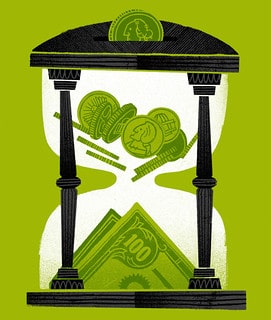
Now, as a nearly fifty-year-old man who has written about personal finance for the past twelve years, I get it. Dad was right: Time is money — and money is time.
This notion is the central lesson of Your Money or Your Life, the personal finance classic by Joe Dominguez and Vicki Robin. "Money is something we choose to trade our life energy for," they write. "You are the one who determines what money is worth to you. It is your life energy. You 'pay' for money with your time. You choose how to spend it." Continue reading...
We didn’t start the FIRE: The true history of financial independence
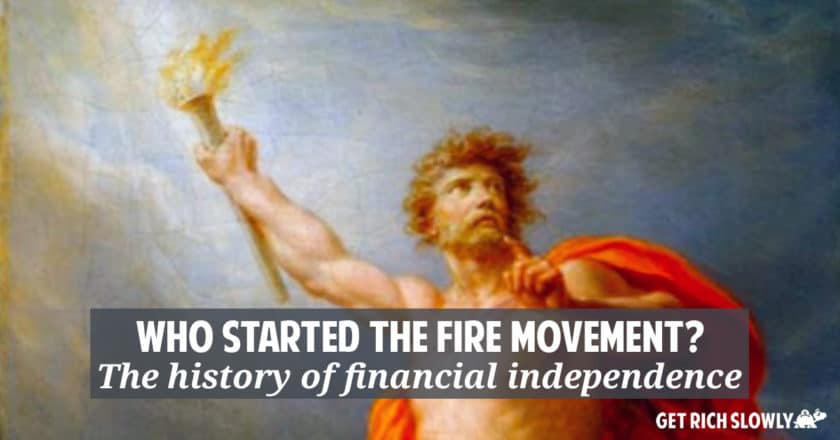
I used to be a collector. I collected trading cards. I collected comic books. I collected pins and stickers and mementos of all sorts. I had boxes of things I'd collected but which essentially served no purpose.
I can't say I've shaken the urge to collect entirely, but I have a much better handle on it than I used to. A few years ago, I sold my comic collection and stopped obsessing over them. Today, I collect three things: patches from the countries I visit, pins from national parks, and -- especially -- old books about money.
Collecting old money books is fun. For one, it ties to my work. Plus, there's not a huge demand for money manuals, so there's not a lot of competition to buy them. (Exception: As much as I'd love a copy of Ben Franklin's The Way to Wealth, so would a lot of other people. That one is out of my reach.)
Myths and misconceptions about financial independence and early retirement

As the financial independence and early retirement movement (or FIRE movement, for short) has gained popularity, some myths and misconceptions have sprung up about what it entails. Too many people make assumptions about what the FIRE movement is and what it's made of.
A lot of folks think the FIRE movement is cult-ish. Some think that financial independence and early retirement are only for rich white people. (Or, more specifically, for white men in the tech industry.) Others say that early retirement is only possible with a high income. Or you can only do this if you're so frugal it hurts. And, of course, there are folks like Suze Orman who "hate hate hate" the FIRE movement because they believe you need millions in order to retire — early or otherwise.
I'll be honest. Each objection and complaint about financial independence contains a grain of truth. But each objection and complaint misses the point in some important ways. Continue reading...
The relationship between time, money, and happiness
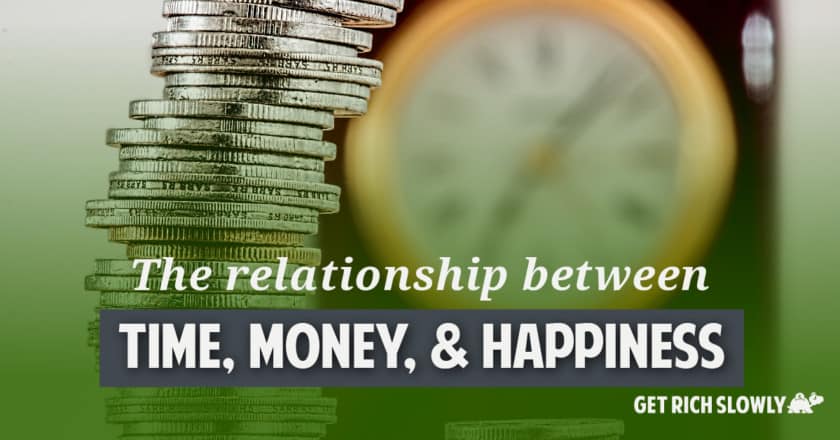
The older I get, the more I'm convinced that time is money (and money is time). We're commonly taught that money is a "store of value". But what does "store of value" actually mean? It's a repository of past effort that can be applied to future purchases. Really, money is a store of time. (Well, a store of productive time, anyhow.)
Now, having made this argument, I'll admit that time and money aren't exactly the same thing. Money is a store of time, sure, but the two concepts have some differences too.
For instance, time is linear. After one minute or one day has passed, it's irretrievable. You cannot reclaim it. If you waste an hour, it's gone forever. If you waste (or lose) a dollar, however, it's always possible to earn another dollar. Time marches forward but money has no "direction".
Financial freedom is time freedom
For the past month, my entire life seems to have revolved around repairs and maintenance on the new house.
Some days, I'm the one doing the work: shoveling level ground for a planned writing shed, crawling under the house to check for leaks, pruning the overgrown hedges. Most days, however, I'm meeting with other folks: roofing contractors, siding contractors, HVAC contractors, plumbing contractors, pest control contractors. For the past thirty days, this has almost been a full-time job!
"You know, you're lucky," a friend said to me a few days ago.
A better way to calculate the value of your time
It's both fascinating and useful to calculate the value of your time. Financial freedom gives you options and flexibility. But without time, that means nothing. Time is a precious resource that we should spend wisely.
Knowing the value of your time is helpful for a variety of reasons:
-
If you're a freelancer, it can help you decide on gigs.
The ultimate round-up collection of personal finance books

Reading books on investing money is a great way to learn more about what you should do at each point in your financial journey. In some respects, it doesn't really matter where you are in your journey because, no matter what you need help with, there's a book that covers it.
Deciding which book to read when, though, can be a bit of a challenge. So we created this huge collection of personal finance books to help with that. Here's how it works:
Beyond wealth: What happens AFTER you achieve financial independence?
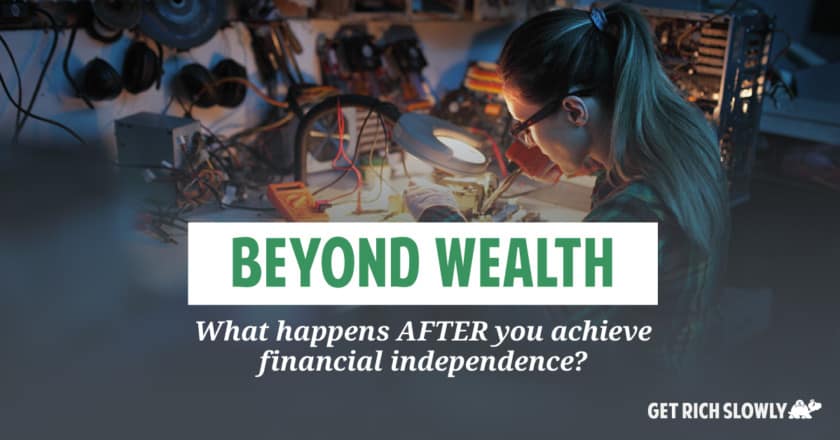
In their classic Your Money or Your Life, Joe Dominguez and Vicki Robin argue that the relationship between spending and happiness is non-linear.
More spending brings more fulfillment — up to a point. But spending too much can actually have a negative impact on your quality of life. The authors suggest that personal fulfillment — that is, contentment — can be graphed on a curve that looks like this:
![Increased spending brings increased happiness -- but only up to a point. [The Fulfillment Curve]](https://www.getrichslowly.org/wp-content/uploads/the-fulfillment-curve.jpg)
